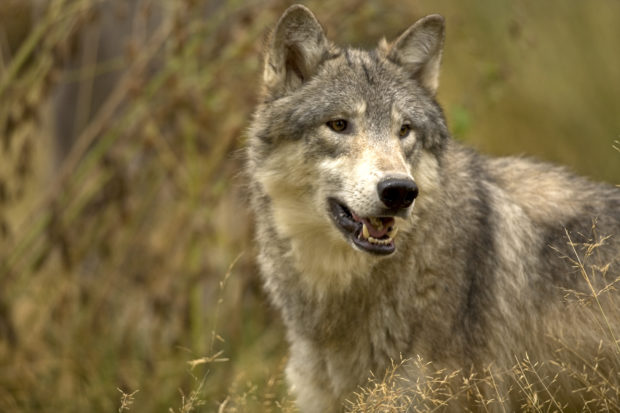
Wisconsin residents got less than 48 hours’ notice about the hearing today, but hundreds of individuals, scientists, and tribal representatives still submitted written comments and nearly 50 people signed up to testify, with the majority opposing such a reckless rush to slaughter. Photo by JAMcGraw/iStock.com
An attempt by some Wisconsin lawmakers to force a rushed and unlawful wolf hunting season in the state beginning next month has been narrowly defeated by the state’s Natural Resources Board.
In November, we reported how we had helped stop an effort by the Wisconsin Natural Resources Board to open a wolf hunting season soon after the Trump administration stripped federal protections for wolves. In a letter to state officials, including Gov. Tony Evers and the Department of Natural Resources, we warned that such an action would be unscientific and illegal, with disastrous consequences for the wolves. Under current Wisconsin law, a wolf hunting season can only begin in the fall.
Shortly after receiving our letter, the DNR announced they would not open a trophy hunt until November 2021 and committed to transparency and broad public engagement before doing so.
Unfortunately, some Wisconsin lawmakers and their allies on the Board decided they could simply disregard those commitments—and the opinion of those who elected them—to try and railroad an early wolf hunting season through.
The lawmakers rushed to hold a joint informational hearing on an early wolf season and then prevailed upon the state’s Natural Resources Board, a governor-appointed group that sets policy for the state’s Department of Natural Resources, to blindside Wisconsin residents and wolf advocates with a special hearing, held today, for a February hunt.
According to the meeting agenda, the legislators sent the board a letter demanding DNR implement a wolf hunt immediately, adding that wolves need to be hunted now before they’re put back on the federal endangered species list.
Wisconsin residents got less than 48 hours’ notice about the hearing today, but hundreds of individuals, scientists and tribal representatives still submitted written comments and nearly 50 people signed up to testify, with the majority opposing such a reckless rush to slaughter.
We are thrilled that the Natural Resources Board chose to listen to these voices today and defeated the motion for an early wolf season by a vote of 4-3. The victory would not have been possible without the tireless advocacy of the Indigenous communities of the Great Lakes, including the Menominee Tribe, Red Cliff, Fond du Lac, Lac du Flambeau and Bad River Bands of Lake Superior Chippewa. The standing of their sovereign governments, which do not support the slaughter of wolves, known as Ma’iingan or Brother Wolf, played a critical role in halting the hunt.
There are so many good reasons why Wisconsin should not rush into a wolf hunt. If Wisconsin were to hold a hunt early in the year, when the state does its annual wolf population estimate, it would not only disrupt its wolf population, but it would be unlikely to have an accurate count of how many wolves are in the state in order to make decisions on hunting quotas. Wolves are in the midst of their breeding season during this time.
Wisconsin also needs to update its wolf management plan, which is more than 20 years old and badly outdated. The current plan would allow hunters and trappers to slash the state’s wolf population by 66%, allowing it to reach an arbitrary and dangerously low population goal of just 350 wolves in the entire state.
The number of wolves lost could be higher because killing a single animal can cause entire families to break apart and lead to young pups, still dependent on their mothers, dying of starvation or predation. A recent Wisconsin-based study also found that allowing the trophy hunting and trapping of wolves can lead to an increase in poaching.
The excuse the lawmakers pushing for an early hunt give—that wolves threaten their rural constituents’ livestock—is exaggerated and based on misinformation. Studies and state and federal data have demonstrated that such conflicts are very rare and are not solved by wolf-hunting seasons. The DNR would have much better results in avoiding any conflict by using proven effective and humane non-lethal methods.
The Wisconsin DNR has repeatedly committed to making the process surrounding the opening of a wolf season transparent, inclusive and thorough. Wolf populations around the United States remain threatened and we are fighting in court to ensure that federal protections for these apex carnivores, so crucial to the ecosystems they inhabit, are reinstated. Meanwhile, we will continue to oppose efforts in Wisconsin and elsewhere to open a season on wolves.
The post Breaking news: Efforts to open an early wolf trophy hunting season in Wisconsin defeated appeared first on A Humane World.
Enviroshop is maintained by dedicated NetSys Interactive Inc. owners & employees who generously contribute their time to maintenance & editing, web design, custom programming, & website hosting for Enviroshop.
